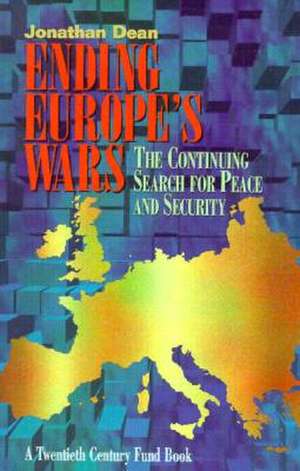Ending Europe's Wars: The Continuing Search for Peace and Secuirty
Autor Jonathan Deanen Limba Engleză Paperback – 31 oct 1994
Preț: 141.31 lei
Nou
Puncte Express: 212
Preț estimativ în valută:
27.05€ • 27.82$ • 22.44£
27.05€ • 27.82$ • 22.44£
Carte indisponibilă temporar
Doresc să fiu notificat când acest titlu va fi disponibil:
Se trimite...
Preluare comenzi: 021 569.72.76
Specificații
ISBN-13: 9780870781971
ISBN-10: 0870781979
Pagini: 441
Dimensiuni: 152 x 228 x 33 mm
Greutate: 0.74 kg
Ediția:Revised
Editura: Twentieth Century Foundation
ISBN-10: 0870781979
Pagini: 441
Dimensiuni: 152 x 228 x 33 mm
Greutate: 0.74 kg
Ediția:Revised
Editura: Twentieth Century Foundation
Textul de pe ultima copertă
In Ending Europe's Wars, Jonathan Dean, a widely recognized expert on European security issues, evaluates the prospects for peace in Europe as a test case for world security. Dean analyzes the current and potential conflicts in Europe and assesses the performance of the multilateral security institutions active in Europe - the North Atlantic Treaty Organization (NATO), the Conference on Security and Cooperation in Europe (CSCE), the Western European Union (WEU), and the United Nations itself - in coping with these challenges. He presents a wide range of innovative proposals for dealing with continuing nuclear dangers in Russia, for bringing NATO, WEU, and CSCE together in a single effective European security organization, and for defusing the ethnic hatreds that have already caused at least five bloody wars. Ending Europe's Wars traces the dramatic course of change in Europe - perestroika, the liberation of Eastern Europe, the collapse of the Soviet Union - to uncover the roots of today's problems. The author shows how these positive developments have also brought real or potential threats to European security: the Russian confrontation with Ukraine; the uncertainties surrounding Russian military intervention in neighboring republics; the possibility that Russia's nuclear arsenal could get out of control; massive population movements sparking racism and intolerance in Western Europe; tragic, unresolved ethnic conflicts in the former Yugoslavia and the states bordering Russia; a resurgent Germany; and growing confrontation with fundamentalist Islam. Dean describes the numerous military constraints, cooperative procedures for conflict prevention, and organizational changes that have madeEuropean security institutions and the confidence-building measures and arms limitations they are based on the most comprehensive and ambitious regional security system in recorded history. He demonstrates why these institutions have nonetheless coped inadequately with Europe's emerging wars, especially in the former Yugoslavia, and how they can be radically improved. Dean concludes that the job of constructing an effective European security system is only half done. The present system could move either toward greater control over conflict or toward slow collapse and renationalization and the expansion of the armed forces of individual European countries. Either outcome will have a decisive effect on the future of the United Nations and global security.
